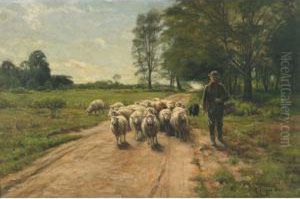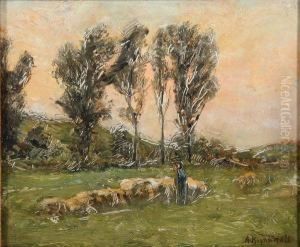Alfred Bryan Wall Paintings
Alfred Bryan Wall was an American artist born in 1861, known for his contributions to landscape painting, particularly focusing on the natural beauty of Pennsylvania. His work is characterized by a keen observation of nature, subtle color palettes, and a serene portrayal of rural American landscapes. Wall’s paintings often depict the lush countryside, rivers, and pastoral scenes of his native state, capturing the changing seasons and the tranquil beauty of the area.
Wall's artistic journey began in Pennsylvania, where he was deeply influenced by the local scenery and the burgeoning American art scene of the late 19th and early 20th centuries. He was part of a generation of artists who sought to capture the essence of the American landscape, at a time when the country was undergoing significant changes due to urbanization and industrialization. Wall's work reflects a desire to preserve and celebrate the untouched aspects of the American countryside, a theme that resonated with many art lovers and collectors of his time.
Throughout his career, Alfred Bryan Wall was involved in various art circles and participated in numerous exhibitions. His work was well received by critics and the public alike, contributing to the broader appreciation of landscape art in America. Despite the popularity of European art trends, Wall remained committed to exploring and depicting the American landscape, believing in its unique beauty and significance.
Wall's artistic legacy is preserved in several art collections and museums across the United States. His paintings continue to be appreciated for their peaceful and idyllic representations of the American landscape, embodying a period in American art where the focus was on capturing the natural world in its most genuine form. Alfred Bryan Wall passed away in 1935, leaving behind a body of work that continues to inspire and captivate audiences with its timeless appeal and profound connection to the American spirit.

